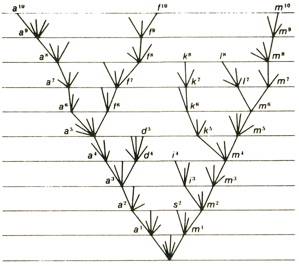Divergent Evolution
Accumulating differences
Online Biology Dictionary
|
|
 Divergent evolution, as shown in the Origin of Species
Divergent evolution, as shown in the Origin of Species
Divergent evolution, as described in conventional evolutionary theory, is a relative phenomenon in which initially similar populations accumulate differences over evolutionary time, and so become increasingly distinct (i.e., they "diverge"). This process also known simply as "divergence," was described in the Origin of Species (1859) and was the subject of the single illustration (see figure right) contained in that book. Even before Darwin, Alfred Russel Wallace (1858) wrote of the "many lines of divergence from a central type."
In the views of both Darwin and Wallace, and thus of traditional evolutionary theory, divergence serves two purposes:
-
It allows a given type of organism to survive in modified form by utilizing new niches;
and - This increase in diversity supposedly boosts a habitat's carrying capacity.
But these are hypothetical propositions that would be difficult, if not impossible to demonstrate experimentally.
When evolution of this type is the sole focus — as has traditionally been the case within the context of standard evolutionary theory — evolutionary change is pictured as treelike, as in the figure above. There is a branching into distinct types, and the branches do not reunite.
In molecular biology, divergence is the percentage of nucleotides differing between two DNA segments (or the percentage of amino acids differing between two polypeptides). The term divergence is used in this context because there is an assumption that the two molecules in question are the descendants of a single ancestral molecule.
However, when not only divergence, but also fusion events, such as hybridization and horizontal transfer, are taken into account, the topology of evolution becomes that of a web. Since evolutionary biologists now know that such fusion events do occur with significant frequency, the representation of evolutionary relationships as simple trees has been called more and more into question in recent years. There is a growing consensus that evolution has often been a reticulate process that involves the rejoining of divergent limbs.
Divergent evolution is the counterpart of convergent evolution. With convergence, organisms whose ancestors are quite different have become more similar under the pressures of selection. For example, flies and birds have evolved to be similar, in the sense that both have wings and can fly, even though their non-flying ancestors were very different. In fact, the two belong to different phyla — about as different as two types of animals can be.
Darwin's ideas about divergence >>
More about Alfred Russel Wallace >>
Most shared on Macroevolution.net:
Human Origins: Are we hybrids?
On the Origins of New Forms of Life
Mammalian Hybrids
Cat-rabbit Hybrids: Fact or fiction?
Famous Biologists
Dog-cow Hybrids
Georges Cuvier: A Biography
Prothero: A Rebuttal
Branches of Biology
Dog-fox Hybrids